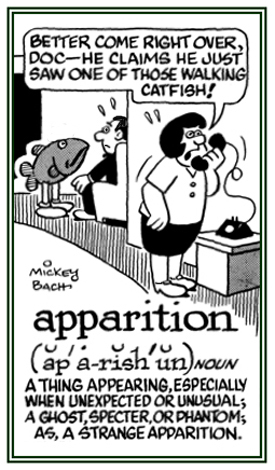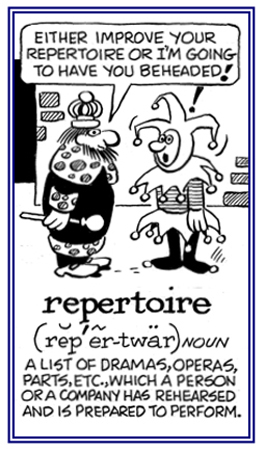pare-, pari-, pear-
(Latin: to come forth, to be visible, to come in sight)
That which is easy to see and to understand: "The apparencies that were suggested were not verified by any evidence."
"Unless there is a genuine example of a so-called apparency, then why should such negative action be taken?"
apparent (adjective), more apparent, most apparent
1. Characteristic of something that is easy to understand or is easy to see or is obvious: "Rebecca's reason for changing jobs was readily apparent and easy to see because she was going to get a higher position and a significant increase in salary."
2. Pertaining to something that seems to be true but possibly is not true: "Jim's father died of an apparent heart attack."
2. Pertaining to something that seems to be true but possibly is not true: "Jim's father died of an apparent heart attack."
"The apparent cause of the series of auto accidents was the icy road."
3. Etymology: from Old French apareir which came from Latin apparere, formed from the prefix ad-, "to, toward" + parere, "show, become visible" + the suffix -ent.
apparently (adverb), more apparently, most apparently
A reference used to describe something that seems to be true based on what is known: "Friends were surprised when the couple's apparently happy marriage ended in less than a year."
"Apparently the winter storm caused many delays and cancelations in air flights because the TV was showing a lot of passengers having to sleep in airports."
"The criticism was apparently untrue since no real evidence was specified."
1. A ghost or ghostlike image of a person: The new owners of the old house say they have seen strange apparitions in the garden at night resembling the former owners who seemed to be emerging from behind the trees and floating past their bedroom!
2. The appearance of something remarkable or unexpected; usually, an image of this type: A mother who lost her three children in a house fire claims that she has had apparitions in which they assured her that they are all right and that she shouldn't worry about them.

© ALL rights are reserved.

© ALL rights are reserved.
Go to this Word A Day Revisited Index
2. The appearance of something remarkable or unexpected; usually, an image of this type: A mother who lost her three children in a house fire claims that she has had apparitions in which they assured her that they are all right and that she shouldn't worry about them.


Go to this Word A Day Revisited Index
for a list of additional Mickey Bach illustrations.
appear (verb), appears; appeared; appearing
disappear (noun), disappears; disappeared; disappearing
1. To pass out of sight; to vanish.
2. To cease to exist; that which can not be seen nor found.
3. To get lost; especially, without a warning or an explanation: "Her son disappeared without a trace."
4. To cease to be seen; that is, by moving away or going behind or into something.
2. To cease to exist; that which can not be seen nor found.
3. To get lost; especially, without a warning or an explanation: "Her son disappeared without a trace."
4. To cease to be seen; that is, by moving away or going behind or into something.
An instance when someone you want to talk to is impossible to find.
1. Someone who will inherit the property of another person if he or she lives longer than the one who is currently possessing the material goods or title: "The queen's oldest son is heir apparent to the throne."
2. A person who is very likely to have a job or position after the one who has it now leaves: "The owner of the company named his son as heir apparent of the business."
2. A person who is very likely to have a job or position after the one who has it now leaves: "The owner of the company named his son as heir apparent of the business."
peer (verb), peers; peered; peering
1. To look closely or carefully; especially, because someone or something is difficult to see: "Gerda peered at the tiny print of the pocket dictionary in an effort to see the word and its definition."
3. Etymology: of uncertain origin, perhaps resulting from aperen, "to appear" and found in Middle English piren, "to peer, to look".
"Jason peered at the people walking on the street by his house from behind a curtain."
2. To come out slightly or to peep out: "During the cloudy day, the sun peered from behind a cloud."3. Etymology: of uncertain origin, perhaps resulting from aperen, "to appear" and found in Middle English piren, "to peer, to look".
1. The songs, plays, operas, readings, music, etc. that a player or an artist is prepared to perform: The band's repertoire includes both modern jazz and classical compositions.
2. The range or number of skills, aptitudes, or special accomplishments that a person or group has been able to do: Alice has a significant number of singing repertoires that she has done for audiences for several years.
3. Etymology: from Latin repertorium, "inventory, list"; from reparere, "to find, to get, to invent"; from re-, "again" + parere, "to produce, to bring forth."

© ALL rights are reserved.
Go to this Word A Day Revisited Index
2. The range or number of skills, aptitudes, or special accomplishments that a person or group has been able to do: Alice has a significant number of singing repertoires that she has done for audiences for several years.
3. Etymology: from Latin repertorium, "inventory, list"; from reparere, "to find, to get, to invent"; from re-, "again" + parere, "to produce, to bring forth."

Go to this Word A Day Revisited Index
so you can see more of Mickey Bach's cartoons.
1. A system by which a permanent theater company presents a set of works during a season, usually in its own theater: A repertory is a group of actors and actresses who perform plays for just a few weeks at a time.
2. Etymology: from Latin repertorium, "inventory, list"; from repertus, reperire, "to find, to get, to invent"; from re-, "again" + parire, a form of paerere, "to produce, to bring forth".
2. Etymology: from Latin repertorium, "inventory, list"; from repertus, reperire, "to find, to get, to invent"; from re-, "again" + parire, a form of paerere, "to produce, to bring forth".
semitransparent (noun), more semitransparent, most semitransparent
Cross references of word families that are related directly, or indirectly, to: "appear, visible, visual, manifest, show, see, reveal, look": blep-; delo-; demonstra-; opt-; -orama; phanero-; phant-; pheno-; scopo-; spec-; vela-, veal-; video-, visuo-.
Showing page 1 out of 2 pages of 19 main-word entries or main-word-entry groups.

